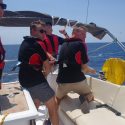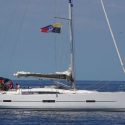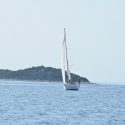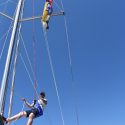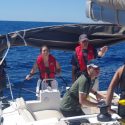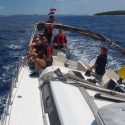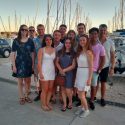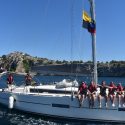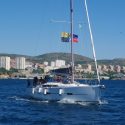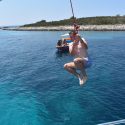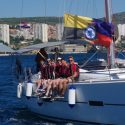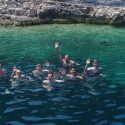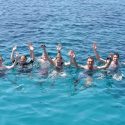Beginning with an early start on Saturday 22nd June, 12 Students and 4 staff members from the University of Birmingham Air Squadron ventured off to begin their 6-day offshore sailing expedition, taking place in the Adriatic Sea along the coast of Croatia. The students began with a range of abilities; however, most were mainly novices at the beginning of the trip. The aim of the expedition was to provide an Offshore Sailing expedition to develop confidence, leadership and team-ethos amongst the UBAS Students and provide the opportunity to experience military AT in an overseas and challenging environment. The exercise enabled the students to build inter-personal skills in a team environment, experience and adapt to the differences of operating overseas and provide experience towards completing RYA qualifications in the future.
We used service transport in order to reach Stanstead before flying to Split, Croatia, and used airport transfer to reach our start location at Šibenik. We embarked from a port north of Split called Šibenik and sailed on to Vis, Hvar, Brac, Split then Rocogniza before returning to the original port. The expedition gave students a taste of offshore sailing and showed what it takes to run and manage a sailing vessel. This is an excellent opportunity to University Air Squadron students – it works towards Adventurous Personal Development Training (APDT) and allowed all participants the time to improve their abilities not only in terms of sailing but also the vast number of personal and inter-personal skills that were required to undertake this expedition.
On arrival at the port on the first day, the skippers inspected the boats and familiarised themselves with the set-up before all the crew boarded. The crews received an expedition brief from the Expedition Leader and safety brief from the Skippers. The teams were then briefed on the plans for the week ahead. Before the night came to an end, the students shopped for food at the nearest supermarket to prepare and cook food for the next few days ahead.
On the first sailing day, the two crews had breakfast and prepared themselves for the day before receiving a daily brief by the qualified staff – this included the state of the boat, plans for the day as well as a met brief. The crews quickly learnt the necessary skills to allow the boat to leave the marina and set off on their way. The students were thrown in at the deep end and had to deal with quite strong wind and learning how to gybe. The weather on this day was fantastic and the wind speed was high enough to reach a cruising speed of around 8 knots! This was great to demonstrate the basic principles of sailing. Also, we were practicing general boat handling and drills using knowledge of sailing knots and different components of the boat. The student cooks of the day were responsible for providing lunch and dinner. On arrival at the mooring, we ended up attaching the boat to some lazy lines and the shore and the evening proceeded in a relaxed manner.
Each day followed in a similar fashion with preparation early in the morning and a daily brief before slipping the lines to begin our day, putting the sail up and then navigating to our next location. On a couple of occasions, we took advantage of the anchoring lessons and so we stopped for lunch in a couple of beautiful lagoons to eat lunch and go for a swim! Also, after having practiced the man overboard procedure in quite some detail with each member of the crew at the helm, we got to see how it would pan out for real when one of the staff members went overboard in a pre-planned test! It’s safe to say that the crew handled the situation in a professional manner, quickly recovering the staff member.
After a morning’s sail the group had some time to rest before preparing to take on a night sail. We chose to take in the sights of the city and explore. Unfortunately, due to 40kt+ winds blowing directly across the berths the skippers made a safety decision to cancel the night sail.
At the end of the week, the two crews put the culmination of learning from the week to the test in a navigation exercise which involved them leading all aspects of the day with no staff involvement. Both teams put in tremendous effort to navigate the final marina in challenging conditions. Unfortunately, one of the boats experienced problems when trying to put a reef in their sail as the winds had gotten too high and their sail jammed causing them to have to go back into shelter using the engine. This was a trend across the week as winds in the morning were calm but as the day heated up and the land was warmed, the seaward winds would increase vastly by the mid-afternoon due to the local topography.
“This week has truly been one of the best of my life! I’d never really given sailing a second thought before this expedition, but after having had the privilege of this fantastic trip, I can safely say that I will be perusing further opportunities in the future!”
Off Cdt Matthew Osbiston

